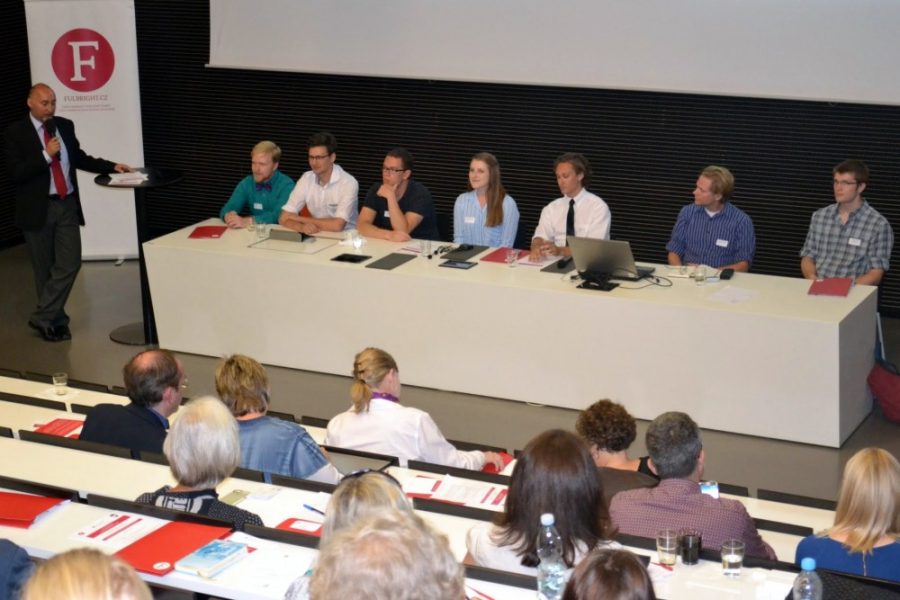PRAGUE — Three students and a professor representing the UA were personally invited to share their experience of studying abroad in the Czech Republic, and to talk about how to bring more students to the country at a Fulbright Conference on June 12.
The event sought to educate Czech university administrators on ways to establish student exchanges, research collaborations and other relationships with U.S. institutions.
Carol Bender, director of the UA’s Undergraduate Biology Research Program and two-time Fulbright recipient, discussed her successes and challenges when developing cooperation plans with Czech universities alongside faculty from Drexel University, Middlebury College and Louisiana State University.
Bender has spent the last three summers at the Institute of Parasitology of the Czech Academy of Sciences in Ceské Budejovice, administering and teaching the students in the UA Prozkoumat program.
The program provides UA students the opportunity to conduct 10 weeks of directed research in a laboratory at the Institute of Parasitology.
The Institute shares a campus with the University of South Bohemia and was once a popular destination for students in a since-disbanded Biomedical Research Abroad program, also directed by Bender.
RELATED: Poland-bound Fulbright scholar finds success between pipettes and pirouettes
“UA students are looking for the types of experiences Czech universities have to offer,” Bender told the crowd of around 100 representatives from institutions across the country.
She listed “shared values” and “responsiveness” as two key factors in establishing and maintaining these international university relationships.
In fact, “the number of American students studying in the Czech Republic increased by 14.6 percent in 2015-2016,” wrote Kai Armstrong, a member of Fairfield University’s Creative Media Marketing team, in a research study presented at the event.
Armstrong cited the strength of Czech academic programs, proximity to other European countries and its affordable cost of living as the major factors drawing students to the country.
Bender also advised Czech universities to carefully consider the academic programs they offer to students, as this is often the determining factor for students.
She suggested making sure courses in English are easily accessible and transferable.
While Bender said she continues to return to the beautiful country because of its people and atmosphere, her students only realize the lasting impacts of a summer abroad after they return home. They return with new experience in international relationships and cutting-edge scientific research alongside their cultural exposure.

“The importance of international collaborations cannot be overstated, particularly in STEM fields where it is imperative that culturally competent STEM professionals work together on issues facing humankind,” Bender told the crowd and wrote in a subsequent press release.
Kimmy Skvarla, Neuroscience and Cognitive Science junior, and Michael Ragone, Electrical and Computer Engineering and Math senior and myself answered audience questions regarding their experience as U.S. students in the Czech Republic.
Skvarla, a student involved in the Prozkoumat program, is conducting 10 weeks of directed research on tick innate immunity in the Laboratory of Vector Immunology headed by Daniel Sojka.
“I have had an amazing experience so far,” Skvarla told the crowd.
She discussed the personal relationships she had formed with her lab mates. Her experience prompted audience questions about the openness of American students to assigned peer mentors and how that helps integrate them into universities and enhance cultural experiences like hers.
The Fulbright Commission also stressed the importance of “cultural exchanges” to “develop mutual understanding” beyond education and research.
RELATED: Ecuador study abroad brings conservation biology to winter break
At Masaryk University in Brno, Ragone is researching the applications of artificial neural networks for problems in chemistry under Associate Professor Premysl Lubal as part of a five-week internship.
“I miss the diversity of American universities,” Ragone told the crowd, but he also said he appreciated the deep cultural and historical knowledge that his Czech lab mates have introduced him to while in the country.
Ragone stressed the importance of easily navigable and mobile compatible websites for Czech universities attempting to attract American students. Samantha Kaplin, a student of Bucknell University, echoed Ragone.
“U.S. universities believe they do not have enough information about Czech universities,” she said.
Still, organizations like the Fulbright Commission offer help and advice, and the willingness of Czech institutions to develop unique, collaborative programs both during both summer and the semester help forge this relationship.
Bender said she was impressed with the eagerness and willingness of the faculty of Czech universities to develop the types of long lasting collaborations that help train students to tackle the global challenges of our day.
“My experience was more than worth the price of admission,” Ragone said.
Editors Note: The author of this story was also a participant in the 2017 Prozkoumat program and spoke on the student panel at the event.
Follow Randall Eck on Twitter.








